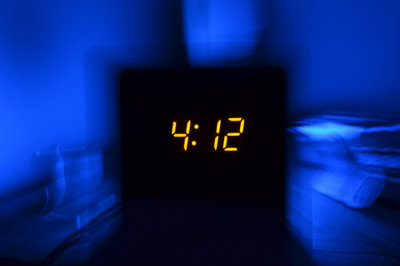Seasonal Affective Disorder – In Summer?

By: Julien Jeanneau
by Andrea M. Darcy
The kids are off school, work has slowed down a bit, and barbecue party season is in full swing. Your vacation away is pending, and everyone around you seems happy and excited.
So why aren’t you? Is it just the stresses of summertime getting you down… or something more?
Seasonal affective disorder in summer
Despite seasonal affective disorder (SAD) always being linked to winter, it’s possible to have it in summer. This is also sometimes referred to as ‘reverse seasonal affective disorder’, or just ‘summertime depression’.
Yes, even with the inconsistent summer season of the UK. One major British newspaper claimed the number suffering each year in the UK is at about around 60, 000.
So if you are finding yourself glum in the sun, read on.
What is seasonal affective disorder?
Seasonal affective disorder, or ‘SAD’, is a form of major depression with a seasonal pattern. This means that people with regular moods the rest of the year find that at certain and predictable times each year, they slip into ongoing low moods.
For most people, seasonal affective disorder begins its onset in autumn, when days get cooler and shorter.
But it’s thought that for about 10% of people who suffer from SAD, it’s the onset of warmer weather and longer days that triggers their depression symptoms.
Some people even report such extreme symptoms as the sun feeling like knives, or just wanting to sit in cold dark rooms. But for many, it’s just consistently feeling depressed every summer.
Symptoms of summertime seasonal affective disorder

By: LMAP
Summertime seasonal affective disorder, like wintertime SAD, is a form of major depressive disorder.
Depression symptoms do vary by individual, but in general they include some or all of the following:
- sad or irritable more often than not
- feeling bad about yourself
- cycles of negative and hopeless thoughts
- anxiety and black and white thinking
- change in sleep patterns
- loss of motivation and interest in activities you usually enjoy
- wanting to be alone
- decreased sex drive
- change in appetite (under or overeating)
- unexplained exhaustion
- foggy thinking.
[Read our comprehensive Guide to Depression for a more detailed overview.]
What is the difference between regular depression and seasonal affective disorder?
To summarise, seasonal affective disorder is different to depression in that:
- it means a marked move into low moods only when the seasons change
- during the rest of the year moods are normal and stable
- your change in mood, motivation and low energy happens at the same time each year
- it’s a seasonal pattern has been going on for several years
- there is not another logical reason for the low moods, such as a string of difficult life changes or a yearly seasonal getaway that you actually deep down dread.
Summertime vs Wintertime Seasonal Affective Disorder
Winter and summer triggered seasonal affective disorders are often lumped together as one condition. But they can be quite different.

By: Benjamin Watson
Winter SAD tends to involve overeating and oversleeping. Sufferers report finding it hard to get out of bed in the morning, and craving carbohydrate-heavy foods.
Summertime seasonal affective disorder, on the other hand, often involves trouble sleeping and a loss of appetite.
It’s also suggested that summertime seasonal affective disorder is more likely to come with anxiety than wintertime SAD, which is more likely to come with lethargy.
And whereas winter SAD often leads to lowered sex drive, those with summertime SAD have been found to feel the opposite.
Bipolar disorder and seasonal affective disorder
It’s possible to experience bipolar disorder in a way that is seasonally affected. It’s thought that about 20% of people who have summertime SAD are in fact bipolar. And one of the first studies to recognise summer triggered SAD was around this phenomenon.
This manifests as symptoms of mania (feeling on top of the world but making impulsive and uncharacteristic decisions, erratic behaviour) during the winter months. You then manifest symptoms of depression and lethargy in the summer.
Of course this can be reversed too, with impulsive behaviour and feeling high on big ideas happening in summer, and feeling slow and down in summer.
How is summertime sadness diagnosed?
Like depression, seasonal affective disorder is not something that can be determined by a simple test like a blood sample. A diagnosis instead involves talking to a health professional, who will ask you a series of questions about your health and personal life history.
If you talk to your GP, they can also run tests to rule out any physical reasons for your mood troubles and changes in sleep and appetite, such as checking your thyroid. They can then refer you on to a mental health professional who can help you with your moods. Or you can book yourself via a private counselling and psychotherapy clinic.
Why does summer trigger depression for me?
The exact reason some people become sad based around the seasons is not fully understood. And summertime SAD is far less researched than its winter-based cousin.
Biological research around wintertime seasonal affective disorder theorises that it has to do with the ways sunlight affects the brain’s creation of the hormones serotonin and
melatonin. Between them these chemicals affect sleep, appetite, and moods. But does this hold true for summer time SAD?
A theory which might be more likely to also cause the summertime variety is that SAD relates to your circadian rhythms, an internal clock that also regulates energy and moods.
What about the heat? It is entirely possible that high temperatures themselves make some people unhappy. But there is little evidence-based research to prove this.
A more researched theory is that SAD is connected to allergies. One study, for example, worked to connect summertime SAD to a pollen allergy. Given that the study was limited to a small group of students from only one ethnicity, though, it’s results would need much further testing.
Do I Need Help for Summertime Sadness?
Summer time does have a romanticised reputation as a time when everyone is happy and lighthearted, but the truth is that it brings its own set of stressors. It is possible that you are depressed because life is actually overwhelming you (read more in our article, on Summertime Blues – Seasonal Stressors to Watch For).
But whether it’s stress, a build up of too many life changes, or seasonal affective disorder? It’s always a good idea to have support if your low moods are making day-to-day living difficult. If you feel that there is a pattern to your mood swings, or that things from the past are being triggered, or even that it’s really time to learn how to manage your stress, it’s worth speaking to a counsellor or psychotherapist about how they can help.
If it is seasonal affective disorder you are suffering from, it’s also an idea to think strategically and seek guidance before the next cycle begins. This can give you the tools and support to navigate the next onset of your low moods in new ways, or even mean that you experience less depression than usual.
 Andrea M. Darcy is a mental health and wellbeing expert and writer. She also runs a consultancy helping people find their perfect therapy and therapist. She’s had SAD in summer since a kid and is convinced it is connected to the redhead gene! Follow her on Instagram for useful life tips @am_darcy
Andrea M. Darcy is a mental health and wellbeing expert and writer. She also runs a consultancy helping people find their perfect therapy and therapist. She’s had SAD in summer since a kid and is convinced it is connected to the redhead gene! Follow her on Instagram for useful life tips @am_darcy





